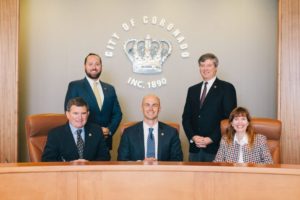
The city council approved charging a $25 annual fee to operate a business in Coronado. The vote was 4-1, with Councilwoman Carrie Downey voting no. The new ordinance goes into effect on January 1, 2019. Downey thought the fee was too low to cover the costs of administering the program.
The new annual fee replaces the business license tax, the business occupancy permit fee and home occupation permit fee. Under the existing ordinance, business license taxes cost from $25 to $2,000 annually. Large hotels pay the highest tax, while individuals running a small business out of a home pay the least. The average tax is $87.
Besides the annual tax, businesses also paid a one-time fee when they set up their business. The fee for a store front was $219. For a home office it was $35. These are eliminated in the new ordinance.
Now everyone from the Hotel del Coronado to a freelance graphic artist will pay $25 a year to do business in Coronado. Tutors, baby sitters and other low impact businesses are exempt.
A review of the city’s licensing fees and taxes was proposed by City Councilman Whitney Benzian and Mayor Richard Bailey in April. “It is very important to revisit our processes and ordinances to stay current,” Bailey said.
The new fee received wide support from the downtown business community. “We applaud the city’s efforts to simplify the process,” said Sue Gillingham, Executive Director of the Coronado Chamber of Commerce.
“The city expects to receive approximately $45 thousand each year from the fees,” according to Jim Kruger, the city’s director of Administration. Downey argued that the fees would not cover costs and suggested the business fees be raised. “Let’s start by covering the costs,” she said and suggested the fee should be raised to at least $40. “People paying $87 now wouldn’t mind paying $40.”
The idea of a lower fee was a way to get more people in the system. “We know the compliance is rather low,” said City Manager Blair King. He also noted that generating revenue wasn’t the primary purpose of the program. It is to collect information about business operating in the city. Knowing who owns a business can assist firefighters and police in an emergency.
The thinking goes that if rates are set low enough more people will comply.
Downey wasn’t buying it. “Paying $35 a year isn’t going to break anyone,” she said. “I support lowering taxes if possible, for our small businesses that pay $87 a year [but] I don’t now see why the residents should be subsidizing our hotels,” she wrote in an e-mail following Tuesday’s meeting.
She also argued that the ordinance wasn’t broad enough. “We should require people who rent their homes to pay a fee as well,” Downey said (she owns a rental property). She cited safety as the primary reason. If a house caught fire, information on the business license would tell the fire department who to notify. The same would be true for any illegal activity taking place on the property that a landlord may not be aware of.
Many on the council thought the idea had merit, but didn’t want to include at this time. “I’m not ready to discuss the rental component,” Benzian said. “We need to let the landlords know” before the council votes.
Bailey suggested that Downey request the council agendize her suggestions for a subsequent meeting. If the council agrees to take up her suggestions and subsequently votes for them, the business fee ordinance would be amended. Downey saw no need to approve an ordinance that will not go into effect for another year.
“A short-delay will give us a better program, allow staff to compute a more accurate program cost and therefore set the right certificate fee amount without a taxpayer subsidization,” she wrote.
In other actions, the council voted unanimously to:
- Accept the Gateway Project’s draft environmental and historic resource compliance reports. The Gateway Project was approved in September 2016. Plans call for changes that will slow traffic coming off the bridge and create a more attractive entrance into the city.
- Approve the electronic filing of campaign disclosure statements. Councilman Bill Sandke reflected the council’s strong support for the change by saying: “It can’t happen soon enough.”
- Agree to reconsider the San Diego Padres request to hold its Pedal the Cause event on the San Diego-Coronado Bridge. The council initially rejected the event because it conflicted with other events scheduled for the same day. Since then the baseball organization has offered to move the ride to November 17 or 18. No other activities are scheduled for these dates and Pedal the Cause will no longer conflict with other events, Bailey noted in his letter to the council asking to agendize the request.




